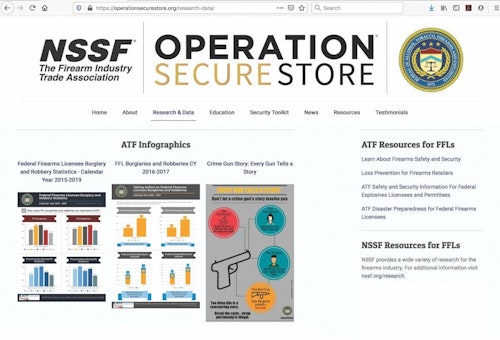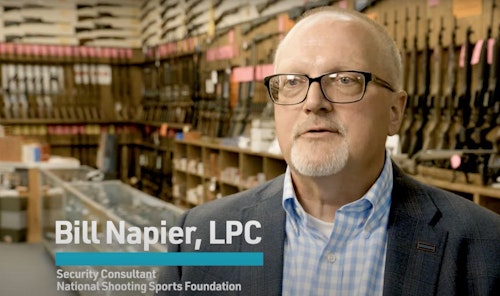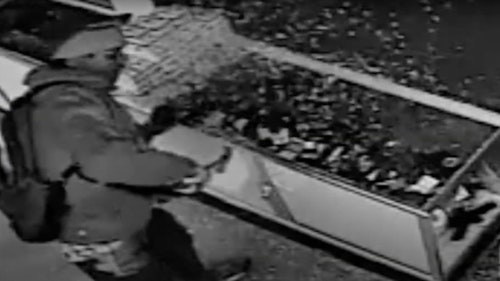
Those long racks of guns on display are a tempting target for thieves. It goes without saying that you should lock them up during non-business hours. Gun thefts come with a long set of problems and hassles. (Photo by Bill Konway)
Most days — especially these days — you’re probably too busy to even take notice, but as the owner of an independent hunting/shooting sports retail store, you wear many hats. Quite possibly, you wear all the hats on the rack when it comes to managing your store. You are the general manager, the HR manager, the PR manager and the advertising manager. And oh, by the way, you’re also responsible for safety, security and risk management for your building, business, inventory and your people.
With all those responsibilities, time to eat, sleep, and stay acquainted with your family are rare commodities. Getting a handle on the most important and effective ways to secure your business may seem like a pipe dream. But there is hope and ultimately a feeling of confidence when your risk management plan is in place and running like clockwork.
Bill Napier is a firearms compliance and security expert with decades of experience in loss prevention with major retailers and other businesses. Today he operates his own consulting firm, and his experience gives him a deep understanding of the struggles of smaller retailers when it comes to securing their operations. He said that doing the right things is much easier if you have the wherewithal to hire an expert or pay someone else to do it for you, but with smaller operations, that’s seldom the case.
However, that doesn’t mean planning for and dealing with security issues is any less important for the smaller retailer. In many ways, it’s actually more important for you. The good news is that Napier offers five important loss prevention steps you can take that may take some time for you or your team but don’t have to cost you anything. In fact, they will save you big time should loss ultimately occur.
1. Review Your Risk Management Plan
“The first tip,” Napier said, “is we recommend every FFL at least annually review their risk management plan. In that plan will be things like, ‘What do we do in the event of a burglary?’ ‘What do we do in the event of a power outage?’ ‘What is the procedure for shelter-in-place, like we are seeing now in many places?’”
With the COVID-19 pandemic and the NSSF’s efforts to ensure firearms and ammunition retailers are considered essential businesses, the list of what-ifs has grown substantially. Napier continued, “What happens if we are prevented from going back to our businesses? What did you do before you left? How did you secure the building? What’s the program to take care of your team to stay in touch? Situational communication . . . all of these things are important.”
2. Check Physical Security Systems
The annual review should also include checks of the physical security equipment. Confirm the recommended (and depending on the jurisdiction, required) equipment such as gates, locks, safes, burglar alarms, closed-circuit TV and external barriers are all working properly and have been maintained as they should be. Napier said, “It’s much better to discover something that isn’t working in a review than it is after an event. It’s best to check all of those physical deterrents on at least a monthly schedule.
“So, you go in, put your system in test, call the alarm company and say, ‘Hey, I want to test my equipment, make sure everything is recording properly.’ With your video equipment, make sure that it’s recording properly at the right speeds, that your storage is good. Where are you storing? How are you storing? How long are you storing? Those types of things.”
3. Train Your Team
The next vital step takes a lesson from law enforcement and the military — train, train, train, then train some more. Make sure your entire team is trained to your standards.
Napier said, “I was always told that with rote memory, it takes 10,000 repetitions to ingrain into your brain so that you automatically do a task rather than having to think about it and then do it. So, the same things apply here. Repetition, train, train, train.
“In my business, here are my standards. When you’re a new hire, I’m going to train you. As you work at the business, we’re going to train together and we’re going to test our programs. We’re going to test our equipment. We’re going to test everything together so that we’re constantly learning, constantly in step with each other instead of scrambling to figure it out after an incident. If we train to it, it’s going to be second nature versus — you know, hoping it just works out.”
4. Partner With Law Enforcement
Law enforcement branches, from the local police department and sheriff’s office to the state police to the FBI and ATF, offer educational and business training services. Taking advantage of these resources will help you and your team prevent and train for incidents. They will also make the introductions and partnerships you’ll need should there ever be a loss.
Napier said, “Get to know these folks before something happens instead of after it happens or during an event. You want to be able to pick up the phone if you need advice or if you need help or if you need to see what’s going on in the neighborhood. Meet your local police officers and the local ATF folks. They can provide information to you as readily as you can provide information to them. You want to know them before anything happens so that you’re partnering, you’re talking, you’re exchanging information.”

5. Explore Operation Secure Store
The National Shooting Sports Foundation created a cooperative partnership with the Bureau of Alcohol, Tobacco, Firearms and Explosives (ATF) to deliver Operation Secure Store (OSS); www.OperationSecureStore.org. It’s a comprehensive initiative to provide FFL holders with education on solutions and services that enhance operational security and aid in identifying potential risks, protecting interests, and limiting disruption of operations should a breech occur.
Not only is OSS important to you as a retailer, but the resources to which it gives access are beneficial to public safety and to the outside communities impacted by these crimes. Taking an active role in prevention of theft and the resulting guns in the hands of criminals is an excellent public relations boon for your store and the industry as a whole. It shows we’re concerned and proactive in prevention.
Napier, and a number of other consultants, were deeply involved in the development of Operation Secure Store. He said, “We’re very proud of this, and it’s no cost. There are great tools here. Even though this is a high-power initiative, there’s no charge for many of the tools at Operation Secure Store.
“At the core of OSS, there is a self-risk assessment. It’s nine steps that you go through and look at your business from front to back, look at your computer security, look at your parking lot security, look at your risk management practices. You can go in there and see, ‘Yeah, I’m good here. Wait a minute. I’ve got a hole in the game plan here; I need to fix this.’
“And it doesn’t take a lot of time. You can delegate it to other team members that you’re building to help you complete. But then once you’re done, if you say, ‘Oh, heck. I need some help with a particular area,’ there are free resources in OSS.”
Napier cited an example of a broken storefront window. The kind of questions asked in the OSS self-assessment reveal what you need to know before you need to know it. He said, “You ought to know that Jim and Mary down the street own the local glass shop, and they can be on site and get me boarded up until the windows are ordered and arrive — that kind of thing,” he said.
The driver behind development of the Operation Secure Store initiatives was the increasing amount of losses experienced by FFLs. According to ATF data, nationwide FFL losses to burglaries and larcenies jumped by 60% from 2014 to 2017. That was a just cause for concern.
The response of the ATF was two-pronged. Napier said, “Today, the way the ATF responds to firearms burglaries is unparalleled. They respond if it’s one gun or a hundred guns, and they put all their resources into the task. These guys are really good at what they do, and the bad guys are starting to figure that out. It’s like, ‘Man we better not mess with the gun store because the ATF will be coming for us.’
“Of course, it’s a collaboration among local law enforcement, the sheriff’s office, state patrols and so on, but the bad guys get locked up.”
NSSF also matches ATF reward offers up to $5,000 for information leading to the arrest and conviction of those guilty of firearm retailer thefts and burglaries. This is a prime example of industry and law enforcement working together to prevent crime and hold those who commit crimes responsible.
The second prong is www.OperationSecureStore.org. Napier said, “We rolled it out a couple of different ways. The NSSF is reaching out to as many FFLs as possible starting with 40,000 kits sent last year.
“It went out in regional meetings where the ATF invites FFLs from their geographic region. So, there will be an office in a major city, and they will reach out to 100, 150, 200, however many the room will accommodate and say, ‘Hey, why don’t you come spend a few hours with us. We’re going to talk about compliance, we’re going to talk about some of the law changes if there are any. Then oh by the way, the NSSF guys and gals are going to talk to you about how to reduce your risk and talk as a businessperson, how you can reduce your risk and do it without spending a lot of money.”
Napier and the rest of the NSSF team conducted 24 such sessions in 2018 and increased to 28 in 2019. They were scheduled for 30 in 2020, before the COVID-19 lockdowns began.
The bottom line is a good one so far. From 2017 to 2019 there was a 40% decrease in FFL losses to burglary and larceny (shoplifting). The one-two-punch of optimized enforcement and education of dealers seems to be working.
Small, Normal Things Make a Big Difference
In many ways, exactly the same things that you do to attract customers will also deter the bad guys. Napier concluded, “Bad guys start forming their opinions as they are driving around casing the joint. They’re looking for opportunities to exploit or leverage a weakness.”
Napier explained, “We call it rings of influence. From the start – the street is a ring. Are all the lights working? Is the signage fresh and crisp? Coming into your parking lot is a ring. Is it clean? Are there no holes in it? Are things clearly marked? Coming inside your building is a ring. Are the rest rooms cleaned? Are the trashcans emptied? Is there a clear path to fire exits? All those things tell your customers it’s a good place to be. They tell your employees it’s a good place to be. They tell the bad guys it’s not a good place to be. When they see you’re paying attention, they are going to go somewhere else.”
Attention to the small steps will lead to big victories. By preventing the bad guys from coming in the first place, you’ll maintain your margins and profit by keeping insurance rates from increasing. You’ll avoid missing sales because of the business being shut down for investigations and because inventory was stolen.
In all, your busy life will be a lot happier.







